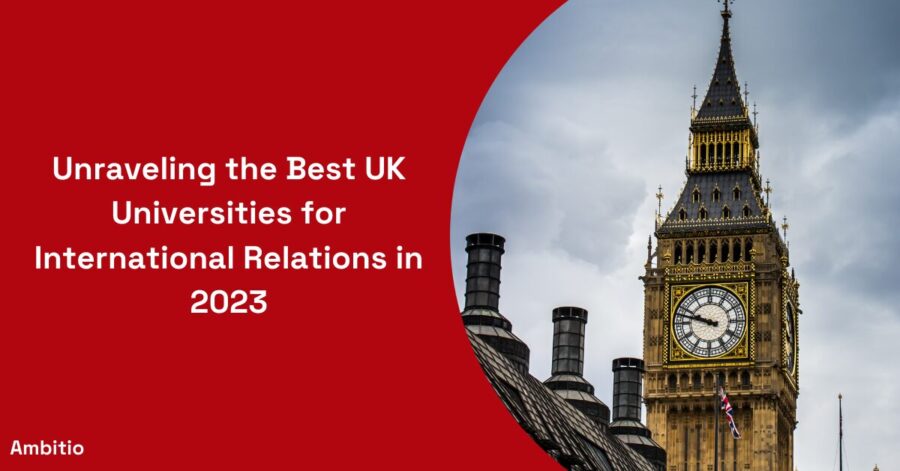13 December 2024
7 minutes read
Unraveling the Best UK Universities for International Relations in 2023

Introduction to the Diverse World of International Relations
In the ever-evolving geopolitical landscape, the study of international relations has grown in prominence. As borders become more porous and nations more interconnected, professionals adept in international relations are sought after.
With a surge in interest in this field, universities have refined and expanded their offerings. In this realm, UK universities for international relations have carved a distinct niche, known globally for their comprehensive curriculum, esteemed faculty, and enriching student experiences. As we step into 2023, let’s dive deep into the institutions that are the epitome of excellence in nurturing global citizens.
The Intersection of Theory and Practice
The academic rigor and practical exposure offered by UK universities are unparalleled. Courses are intricately designed, blending core theoretical concepts with real-world applications.
Students are not just imbued with knowledge but also skills that are instrumental in the complex world of international diplomacy and global affairs.
Learning Beyond Classrooms
An international relations degree at these esteemed institutions transcends traditional classroom learning. It involves simulations, case studies, and interactions with diplomats and international leaders.
These universities foster an environment where learning is not confined to textbooks but extends to real-world scenarios, offering insights into the complexities of global politics, economics, and law.
Global Perspectives
In a world marked by diversity, having a global perspective is not just an asset but a necessity. UK universities for international relations are characterized by their cosmopolitan campuses.
Students from around the globe converge, bringing with them unique insights, experiences, and perspectives that enrich the learning environment.
A Melting Pot of Cultures
At institutions like the London School of Economics and the University of Oxford, the classroom is a microcosm of the world. Discussions are not unilateral but are characterized by a multiplicity of views.
Each student, with their unique background, contributes to a rich tapestry of perspectives that helps in understanding international relations in all its depth and breadth.
Career Prospects
A degree in international relations from a top UK university is a gateway to myriad career opportunities. Graduates are not confined to a single career path but have the versatility to venture into various fields, including diplomacy, international law, and global business.
From Classrooms to Global Arenas
The curriculum is tailored to equip students with skills that are transferrable and highly valued. Alumni of these institutions are found in influential positions across the globe. They are not just observers but active participants and changemakers in the global landscape.
Alumni Network
The alumni network of these institutions is one of their most significant assets. Being a part of these universities means being connected to a network of individuals who are leaders, innovators, and influencers in the field of international relations.
A Lifetime Connection
Graduating from these institutions is the commencement of a lifelong journey where alumni stay connected. They are resources, mentors, and connections, opening doors to opportunities globally.
The alumni network is not just a testament to the quality of education but a support system that extends beyond the years spent at the university.
Future of International Relations Education
As the world evolves, so does the field of international relations. These universities are at the forefront of innovation in education, ensuring that students are not just abreast with current trends but are prepared for future developments.
Innovations and Trends
The curriculum is dynamic and ever-evolving. Artificial Intelligence, machine learning, and data analytics are making their way into the study of international relations. These universities ensure that students are equipped with not just knowledge but skills that are essential for the future.
Tailoring Your Academic Journey
Every student is unique, and so are their academic and professional aspirations. These universities offer flexibility, allowing students to tailor their academic journey, choosing electives and specializations that align with their interests and career goals.
A Personalized Path
The array of electives and specializations ensures that learning is not generic but personalized. Students are not just passive recipients of knowledge but are empowered to chart their unique academic journeys, aligning with their interests, passions, and career aspirations.
Scholarships and Financial Aid
The pursuit of quality education, especially in a field as dynamic and impactful as international relations, can often be met with financial constraints.
UK universities, globally recognized for their esteemed international relations programs, are also renowned for offering a myriad of financial assistance options.
These are meticulously curated to ensure that monetary limitations do not hinder aspiring students from embarking on an enriching educational journey that promises to mold them into global leaders.
Diverse Scholarship Opportunities
Scholarships are one of the most common forms of financial assistance, and UK universities for international relations boast a diverse array of these.
They are meticulously tailored to cater to a broad spectrum of students. Merit-based scholarships are awarded to students exemplifying exceptional academic prowess, leadership skills, and contributions to their communities. These scholarships recognize and reward excellence, enabling the brightest minds to access quality education.
Furthermore, need-based scholarships are pivotal in bridging the financial gaps for students who exhibit immense potential but are restrained by economic limitations. These scholarships are comprehensive, often covering tuition, living expenses, and sometimes even additional academic expenditures.
International Students’ Scholarships
The global reputation of UK universities attracts a diverse cohort of international students each year. Recognizing the specific challenges and needs of international candidates, many universities offer scholarships exclusively tailored to them.
These are designed to mitigate the financial burden of international tuition fees, living expenses in the UK, and other associated costs. The criteria for these scholarships often encompass academic achievements, leadership experiences, and potential contributions to the university’s international community.
They are not merely financial aids but a recognition of the global talents that augment the diversity and richness of the academic environment.
Grants and Bursaries
Beyond scholarships, students can also explore various grants and bursaries offered by universities, governmental bodies, and international organizations. Unlike loans, these financial aids do not need to be repaid and can significantly reduce the financial burden on students.
The allocation of these grants and bursaries often considers factors such as household income, academic achievements, and field of study. They are instrumental in ensuring that financial constraints do not impede the academic aspirations of deserving candidates.
Work-Study Opportunities
Many universities also facilitate work-study opportunities, allowing students to work part-time during their academic tenure. These opportunities are not just a source of financial relief but also offer practical experience, enriching the student’s academic journey.
Work-study roles are often available on campus, providing students with the convenience of balancing their academic and work commitments effectively.
They foster a pragmatic learning environment where students can apply their academic knowledge in real-world scenarios, enhancing their readiness for post-graduate professional endeavors.
Loan Options
For students who might not qualify for scholarships or grants, or need additional financial support, various loan options are also available. These loans often offer favourable terms with low-interest rates and deferred repayment options until after the completion of the degree. Students and parents can explore these options to facilitate the financial aspects of higher education.
Application Process and Entry Requirements
Navigating the application process of UK universities for international relations can be intricate but is fundamentally rewarding. Each esteemed institution has laid out specific criteria, meticulously designed to evaluate aspiring candidates’ aptitude, passion, and readiness for the intensive and enriching curriculum ahead.
Understanding and fulfilling these entry requirements is a pivotal step towards securing a seat in these globally recognized institutions and paving the way for a promising career in international relations.
Comprehensive Application Review
The application process at the best UK universities for international relations is characterized by its comprehensive nature. Every application is scrutinized to evaluate not only the candidates’ academic credentials but also their extracurricular achievements, leadership qualities, and a demonstrated interest in international affairs.
Each university seeks students who bring a diverse perspective, intellectual curiosity, and a proven track record of excellence in their previous academic endeavors.
Standardized test scores, where applicable, letters of recommendation, personal statements, and sometimes interviews are integral components of the application review process.
Academic Credentials
Outstanding academic achievements are fundamental. Applicants are expected to have strong A-levels or equivalents, showcasing their academic prowess.
For international students, a thorough evaluation of their high school transcripts alongside standardized test scores, if required, forms the core of the academic review.
The universities are looking for students who have not only excelled in their studies but have also shown a keen interest in international relations, evidenced by their subject choices, projects undertaken, or extracurricular activities aligned with the field.
Personal Statements and Essays
Personal statements and essays play a crucial role in the application process. They offer applicants an opportunity to showcase their passion for international relations, their understanding of global affairs, and their aspirations in the field.
Universities value students who can articulate their thoughts, demonstrate critical thinking, and express a clear vision of their academic and professional journey in international relations.
The essays should reflect the candidates’ awareness of current international issues, their perspectives, and their eagerness to contribute to the global discourse. It’s an opportunity to exhibit how they can enrich the diverse and dynamic classroom environment of the university.
Letters of Recommendation
Letters of recommendation provide insights into the candidates’ abilities, character, and contributions from a third-party perspective. Recommenders vouch for the applicants’ academic capabilities, their interpersonal skills, and their potential to contribute to and benefit from the international relations program.
Each letter should offer unique insights, collectively painting a comprehensive picture of the candidate as a promising student, a collaborative peer, and a future leader in international relations.
Interview Process
Some universities include an interview process to further assess the candidates. These interactions allow the admissions committee to evaluate the applicant’s communication skills, their depth of understanding of international relations, and their fit within the university’s ethos and academic culture.
Preparation for these interviews should encompass not only a robust understanding of international affairs but also a clear articulation of why the particular university is the preferred choice for the candidate and how they envisage their academic journey unfolding there.
Final Selection
Post the meticulous evaluation process, successful candidates receive offers of admission. These offers are not just an acknowledgment of their past achievements but a testament to the universities’ belief in their potential to excel in the field of international relations and make significant contributions to the global community.
Conclusion
Navigating the landscape of UK universities for international relations requires comprehensive insights and understanding. As we step into 2023, equipped with the knowledge of the unique offerings, illustrious alumni networks, and innovative curricula of these esteemed institutions, aspiring students are one step closer to making informed decisions.
Each university, with its unique offerings and distinct strengths, is a gateway to opportunities, learning, and global citizenship. The journey towards becoming a skilled, informed, and empowered professional in international relations begins with choosing the right institution.
FAQs
Q1: Which are the top UK universities for international relations in 2023
The University of Oxford, London School of Economics, University of St Andrews, and King’s College London are among the top picks based on university rankings 2022.
Q2: What are the entry requirements for international relations courses in the UK?
Entry requirements vary, but generally include strong A-levels or equivalent, proficiency in English, and a keen interest in politics and international affairs.
Q3: Can I study international relations alongside another subject?
Yes, many universities offer joint degree options allowing students to study international relations with subjects like law, economics, or languages.
Q4: How do league tables rank the best UK universities for international relations?
Rankings are based on factors like academic reputation, employer reputation, faculty/student ratio, international faculty and student numbers, and citations per faculty.
Q5: What career options are available for international relations graduates?
Careers include diplomacy, international law, global business, intelligence analysis, and roles in international NGOs, among others.

You can study at top universities worldwide!
Get expert tips and tricks to get into top universities with a free expert session.
Book Your Free 30-Minute Session Now! Book a call now




























